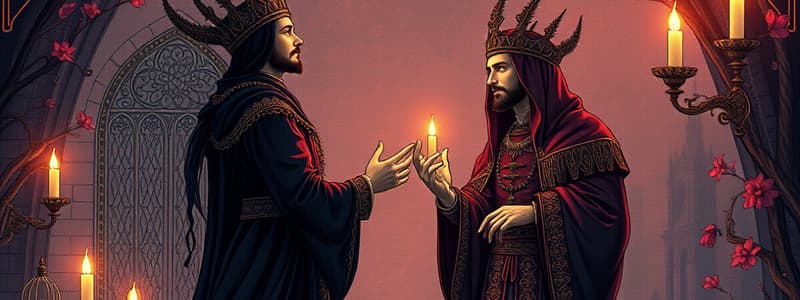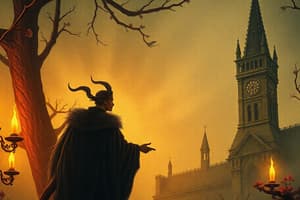Podcast
Questions and Answers
Where do the witches plan to meet again, and why?
Where do the witches plan to meet again, and why?
In the middle of nowhere, to meet Macbeth when the time is right.
What is the atmosphere of the play?
What is the atmosphere of the play?
Evil, dark, mysterious.
What is the last line, and what does it mean?
What is the last line, and what does it mean?
"Fair is foul and foul is fair" - What's good is bad and bad is good.
With whom is Scotland at war?
With whom is Scotland at war?
What does Macbeth do to the rebel Macdonwald?
What does Macbeth do to the rebel Macdonwald?
What is the reader's first impression of Macbeth?
What is the reader's first impression of Macbeth?
What has the Thane of Cawdor done, and what is his punishment?
What has the Thane of Cawdor done, and what is his punishment?
Why does Duncan give the title Thane of Cawdor to Macbeth?
Why does Duncan give the title Thane of Cawdor to Macbeth?
What words does Macbeth echo in line 39, page 31?
What words does Macbeth echo in line 39, page 31?
What does Macbeth mean by 'fair' and 'foul'?
What does Macbeth mean by 'fair' and 'foul'?
List three ways the witches 'hail' Macbeth.
List three ways the witches 'hail' Macbeth.
What do the witches tell Banquo?
What do the witches tell Banquo?
What news does Ross bring Macbeth?
What news does Ross bring Macbeth?
What is Banquo trying to warn Macbeth about?
What is Banquo trying to warn Macbeth about?
What does Macbeth mean when he says, 'If chance will have me King, why, chance may crown me without my stir'?
What does Macbeth mean when he says, 'If chance will have me King, why, chance may crown me without my stir'?
What does Duncan announce?
What does Duncan announce?
What is Macbeth's reaction to Duncan's announcement?
What is Macbeth's reaction to Duncan's announcement?
What does Duncan mean by 'There's no art to find the mind's construction in the face'?
What does Duncan mean by 'There's no art to find the mind's construction in the face'?
What does Lady Macbeth criticize about her husband's character?
What does Lady Macbeth criticize about her husband's character?
What does Lady Macbeth mean by 'unsex me here'?
What does Lady Macbeth mean by 'unsex me here'?
Explain Lady Macbeth's speech.
Explain Lady Macbeth's speech.
Explain the irony in Duncan's speech when he arrives at Macbeth's castle.
Explain the irony in Duncan's speech when he arrives at Macbeth's castle.
What argument does Lady Macbeth use to convince her husband to murder Duncan?
What argument does Lady Macbeth use to convince her husband to murder Duncan?
What are Macbeth's doubts about the murder?
What are Macbeth's doubts about the murder?
What is the plan to murder Duncan?
What is the plan to murder Duncan?
Explain the last line on page 64.
Explain the last line on page 64.
What type of plays did Shakespeare write?
What type of plays did Shakespeare write?
Flashcards
Fair is foul and foul is fair
Fair is foul and foul is fair
A motif in Macbeth that signifies the interplay of good and evil, where appearances are deceptive, and morality is reversed.
Atmosphere of Macbeth
Atmosphere of Macbeth
The setting of Macbeth, characterized by darkness, evil, and a sense of mystery, foreshadowing the play's tragic events.
Macbeth's initial characterization
Macbeth's initial characterization
The initial portrayal of Macbeth as a courageous hero, loyal to his nation's defense, setting the stage for his later downfall.
Thane of Cawdor's betrayal
Thane of Cawdor's betrayal
Signup and view all the flashcards
Macbeth's title of Thane of Cawdor
Macbeth's title of Thane of Cawdor
Signup and view all the flashcards
Macbeth's reflection on the day
Macbeth's reflection on the day
Signup and view all the flashcards
Witches' prophesies
Witches' prophesies
Signup and view all the flashcards
Banquo's fate
Banquo's fate
Signup and view all the flashcards
News from Ross
News from Ross
Signup and view all the flashcards
Banquo's warning to Macbeth
Banquo's warning to Macbeth
Signup and view all the flashcards
Macbeth's thoughts on fate
Macbeth's thoughts on fate
Signup and view all the flashcards
Duncan's announcement about Malcolm
Duncan's announcement about Malcolm
Signup and view all the flashcards
Macbeth's reaction to Malcolm's title
Macbeth's reaction to Malcolm's title
Signup and view all the flashcards
Duncan's trust in the Thane of Cawdor
Duncan's trust in the Thane of Cawdor
Signup and view all the flashcards
Lady Macbeth's critique of Macbeth
Lady Macbeth's critique of Macbeth
Signup and view all the flashcards
Lady Macbeth's desire to be unsexed
Lady Macbeth's desire to be unsexed
Signup and view all the flashcards
Lady Macbeth's intent to murder
Lady Macbeth's intent to murder
Signup and view all the flashcards
Irony of Duncan's comments
Irony of Duncan's comments
Signup and view all the flashcards
Lady Macbeth's persuasion of Macbeth
Lady Macbeth's persuasion of Macbeth
Signup and view all the flashcards
Macbeth's inner conflict
Macbeth's inner conflict
Signup and view all the flashcards
Macbeth's murder plan
Macbeth's murder plan
Signup and view all the flashcards
Macbeth's last line reflection
Macbeth's last line reflection
Signup and view all the flashcards
Shakespeare's play types
Shakespeare's play types
Signup and view all the flashcards
Study Notes
Witches and Their Meeting
- Witches plan to convene in a desolate area to meet Macbeth when the moment is right.
Atmosphere
- The ambiance is characterized by evil, darkness, and mystery.
Key Phrase
- "Fair is foul and foul is fair" suggests a moral inversion where good is bad and bad is good.
War Context
- Scotland is engaged in battle against Norway.
Macbeth's Valor
- Macbeth defeats rebel Macdonwald, famously killing him and displaying his head on a stake.
Macbeth's Characterization
- Initial portrayal of Macbeth as a courageous hero committed to his nation's defense.
Thane of Cawdor
- The Thane of Cawdor betrays Scotland and faces execution as punishment.
Title Reward
- Duncan bestows the title of Thane of Cawdor on Macbeth as a reward for his victory in battle.
Macbeth's Reflection
- Macbeth echoes the phrase, "So foul and fair a day I have not seen," reflecting on the contradictory nature of his experiences.
Witches' Prophecies
- They acknowledge Macbeth's future titles: Thane of Glamis, Thane of Cawdor, and King.
Banquo's Fate
- The witches prophesy that Banquo will father kings but will not be one himself.
News from Ross
- Ross informs Macbeth that he has been granted the title of Thane of Cawdor.
Banquo's Warning
- Banquo advises Macbeth to avoid becoming overly ambitious or rash, cautioning against the seductive nature of ambition.
Macbeth's Thoughts on Fate
- Macbeth muses that if fate intends him to be King, it may happen without action on his part.
Duncan's Announcement
- Duncan declares that his son Malcolm is now the Prince of Cumberland.
Macbeth's Reaction
- The announcement complicates Macbeth's aspirations, making him feel the need to eliminate two rivals to seize the crown.
Duncan's Trust Betrayal
- Duncan reflects on the difficulty of reading a person's true intentions from their appearance, lamenting his misplaced trust in the Thane of Cawdor.
Lady Macbeth's Critique
- Lady Macbeth believes her husband lacks the ruthlessness and ambition necessary to ascend to the throne.
"Unsex Me Here"
- Lady Macbeth wishes to shed her femininity and gain male attributes to pursue power ruthlessly.
Lady Macbeth's Intent
- She reveals her determination to murder Duncan under the guise of hospitality, urging Macbeth to remain composed.
Irony of Duncan's Comments
- Irony arises as Duncan praises Macbeth's castle while unknowingly approaching his murder site.
Lady Macbeth's Persuasion
- She argues that she would commit heinous acts for ambition, encouraging Macbeth to fulfill his promise to kill Duncan.
Macbeth's Inner Conflict
- Macbeth grapples with the morality of killing Duncan, feeling guilt as a kinsman and host.
Murder Plan
- The plot involves killing Duncan in his sleep after intoxicating his guards and framing them for the murder.
Last Line Reflection
- Macbeth concludes that outwardly feigning innocence is necessary while harboring dark intentions internally.
Shakespeare's Play Types
- Shakespeare is known for writing tragedies and intricate love and suspense stories.
Studying That Suits You
Use AI to generate personalized quizzes and flashcards to suit your learning preferences.




